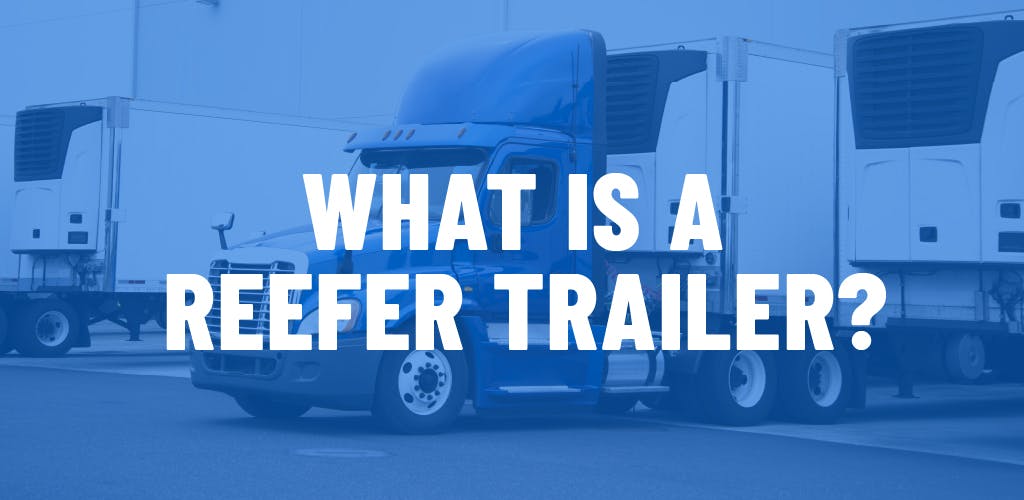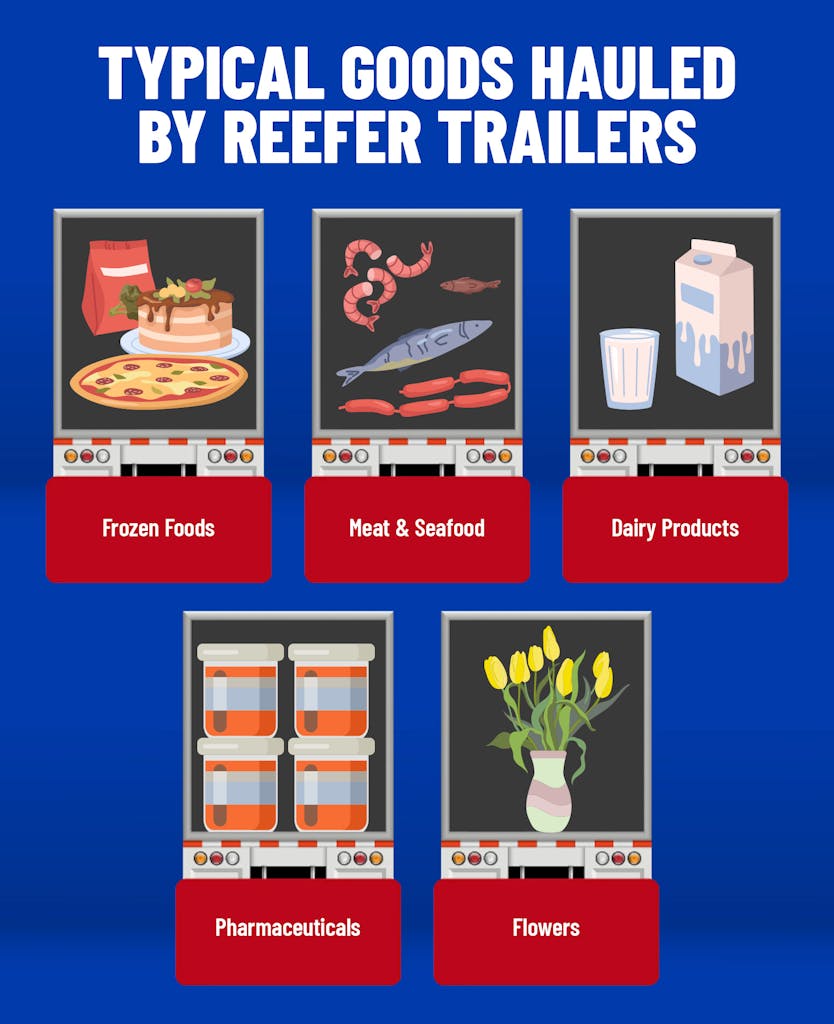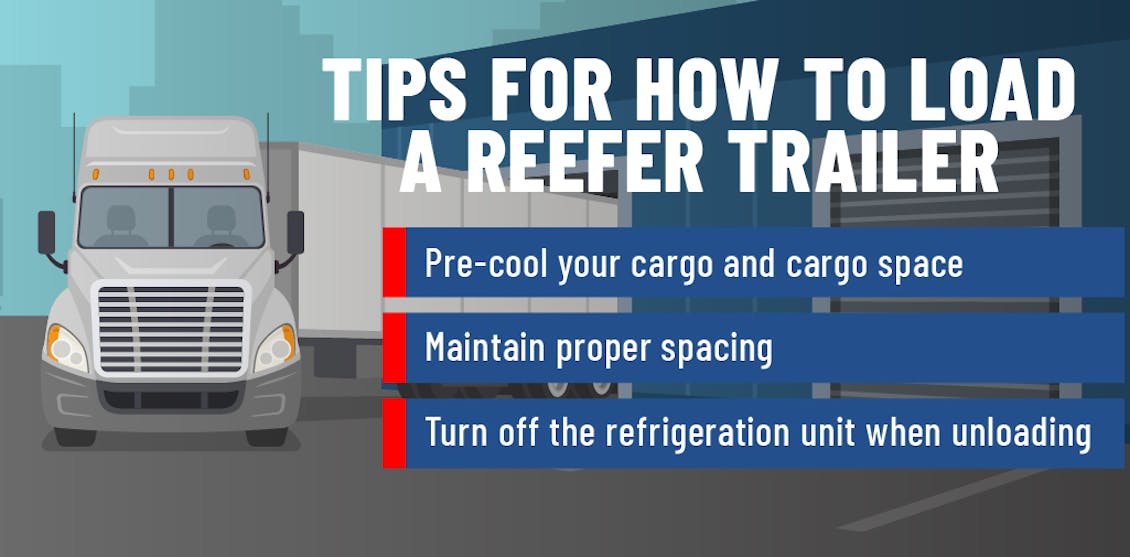What is a Reefer Trailer? (Complete Guide)
January 30th, 2023

A reefer trailer is an insulated trailer designed to transport perishable goods that require temperature control. These types of trailers are very common and are used to various types of industries.
If you want to know what a reefer trailer is used for, think of these items you probably consume regularly:
- Dairy products
- Flowers
- Fruit and vegetable produce
- Meats
- Pharmaceuticals
These are items that usually spoil quickly and need to be hauled by reefer trailer.
In this guide, we’ll walk you through what a reefer trailer is, how it works, and why having one can be beneficial for your business.
Why Do They Call it a Reefer Trailer?
The term “reefer” is a shortened version of the word “refrigerator.”
This is why a reefer trailer is typically used to transport perishable products. These units are often used in the food and beverage industry, as they reduce spoilage while still maintaining a consistent temperature across the load.
They can be used to transport a variety of items including baked goods, meats, fruits, and vegetables.
What is a Reefer Trailer Used For?
The interior temperature of a reefer trailer can be set to any desired level so that frozen foods or other goods can be transported without damage or loss of quality.
A reefer trailer is primarily used for transporting perishable goods such as food, medicine, and other items that require a specific temperature range. Reefer temperature ranges can be set before the load is in. So, if your load is ice cream, the unit can keep it frozen to keep the quality and shelf life of the products.
Typical Goods Hauled by Reefer Trailers

Reefer trailers are used for the transportation of temperature-sensitive goods that need to be kept at a certain temperature.
Below you will find typical goods hauled by reefer trailers:
- Fresh fruits and vegetables: These perishable items require specific temperatures to remain fresh during transport.
- Frozen foods: Frozen foods such as ice cream, frozen meals, and frozen vegetables are often transported in reefer trailers to keep them frozen during transit.
- Meat and seafood: These products need to be kept at specific temperatures to maintain their quality and prevent spoilage.
- Dairy products: Milk, cheese, and other dairy products are commonly transported in reefer trailers to keep them fresh and at the correct temperature.
- Pharmaceuticals: Many pharmaceutical products, including vaccines and temperature-sensitive drugs, require specific temperature ranges to maintain their effectiveness.
- Flowers: Reefers are also used to transport flowers in order to keep them fresh during shipping.
This is not an exhaustive list, but it gives you an idea of the variety of common goods that reefer trailers are used to transport.
What is the Difference Between a Reefer Trailer and a Dry Van?
The main difference between a reefer trailer and a dry van is the type of cargo they are designed to transport. Reefer trailers are for perishable goods that need to be kept at specific temperatures, while dry vans are for non-perishable goods.
A reefer trailer can transport refrigerated cargo in the form of food, pharmaceuticals, and chemicals. In contrast, dry vans are used to transport non-perishable goods including paper products and construction materials.
Tips for How to Load a Reefer Trailer

You’ve finished preparing your cargo, and now it’s time to load.
There are several approaches to streamline the reefer trailer loading process to ensure stable temperature and successful delivery.
Below are a few tips for how to load a reefer trailer:
- Pre-cool your cargo and cargo space: If items need to be kept at 25 degrees Fahrenheit during their travel, they should be at that temperature when they’re loaded. This is ideal for them as well as the refrigeration unit on the truck trailer.
- Maintain proper spacing: Airflow is essential for keeping cargo chilled in a refrigerated semi-trailer. Anything that restricts ventilation increases the likelihood of hotspots forming in the trailer. Leave at least 2 inches between the products and the trailer sidewalls, 4 inches of clearance from the doors, and 9 inches overhead.
- Turn off the refrigeration unit when unloading: Once you get to your location, turn off the cooling unit. If you leave it running while having the doors open after unloading, you’ll welcome in warm, humid air that will freeze on the unit’s evaporator coil. This can impact the unit’s cooling performance, causing the cooling unit to enter defrost mode regularly. When in this mode, the unit does not cool.
Is a Reefer Trailer Best for My Freight?
With the increase in global trade, reefer trailers are one of the most popular modes of transporting perishable goods. They offer several advantages over other shipping options, including low fuel consumption and improved driver safety. Reefer trailers are also versatile enough to be used for both domestic and international shipments, making them ideal for all kinds of freight businesses.
Think of the cargo you transport regularly. If it’s mostly perishable goods, such as fresh produce, frozen foods, or pharmaceuticals, that require a specific temperature range to maintain their quality and safety, then a reefer trailer would be a good investment for your freight.
Frequently Asked Questions
How Cold Can a Reefer Trailer Get?
A standard reefer trailer can get as cold as -13 degrees Fahrenheit or even below depending on the type of refrigeration unit and the settings. Specialized units that can go as low as -85 degrees Fahrenheit are usually for pharmaceuticals that need to maintain a specific temperature for chemical balance, The temperature range can be adjusted as needed to ensure that the products inside the trailer are kept at the appropriate temperature and remain in good condition during transport.
What Kind of Fuel Does a Reefer Trailer Use?
A standard reefer trailer runs on diesel fuel.
Let Hale Trailer Provide Your Next Reefer Trailer
If you are unsure if a reefer trailer is for you, contact us for advice on the best type of trailer for your freight. We can help you determine the best option based on the type of cargo and other factors that may be relevant to your shipment, and whether renting, or buying a new or used reefer trailer is the best fit for your budget.
Hale Trailer can assist you with finding a flatbed to carry your products, ensuring that everything reaches on time and in good condition. Our professionals are available to answer any questions you may have as a dependable transportation partner. Our trailer inventory is ready for the long haul, whether you’re looking to rent or even buy used flatbed trailers. If you want to learn more about how we can work for you, browse our inventory online or visit one of our trailer rental locations.
All the information on this website – https://www.haletrailer.com – is published in good faith and for general information purposes only. Hale Trailer Brake and Wheel does not make any warranties about the completeness, reliability and accuracy of this information. Any action you take upon the information you find on this website, is strictly at your own risk. Hale Trailer Brake and Wheel will not be liable for any losses and/or damages in connection with the use of our website.
